
This site contains copyright and fair use guidelines and best practices for educational tools and for the filmmaking and video industry.
- Subject:
- Career and Technical Education
- Material Type:
- Reading
- Date Added:
- 12/01/2023

This site contains copyright and fair use guidelines and best practices for educational tools and for the filmmaking and video industry.
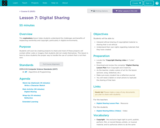
This exploratory lesson helps students understand the challenges and benefits of respecting ownership and copyright, particularly in digital environments. This lesson aligns to national Computer Science standards from CSTA.

Students are asked to reflect on who owns their creative works from this class, such as their pixel images, before reading an article describing how ownership can become complicated as analog works become digital artifacts. After reading the article, students watch several videos explaining copyright and introducing them to the Creative Commons. Students then re-read the article answering three questions about the benefits, harms, and impacts of current copyright policy. Students use their new understanding of copyright to form an opinion about current copyright policies and create a small poster justifying their opinion with a quote from the article.
This lesson is aligned to CSTA standards.

Creative Commons is a non-profit organization that offers tools to authors and artists to create a "some rights reserved" copyright.

Understand the use of Creative Commons. [2:21]
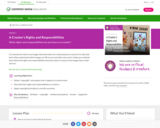
What rights and responsibilities do you have as a creator? It's common for kids to use images they find online, for school projects or just for fun. But kids don't often understand which images are OK to use and which ones aren't. Help your students learn about the rights and responsibilities they have when it comes to the images they create and use. Approximately 45 mins.
LESSON OBJECTIVES: Define "copyright" and explain how it applies to creative work. Describe their rights and responsibilities as creators. Apply copyright principles to real-life scenarios.
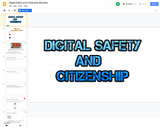
This is a google slides presentation that requires students to complete various tasks related to the following topics:
a) web safety
b) website evaluation
c) copyright
d) plagiarism
e) citations
Students then choose one of those topics and produce an artifact that reviews what was learned within the modules. Project choices include a video, podcast or infographic.

The copyright process has become fairly simple with traditional works like books, plays, movies, and theater. But copyright is a little more difficult with the advent of the internet. For example, bloggers must be aware of what they write, to avoid copyright, trademark, and libel issues. And before you use an image from the internet you need to be sure to get a license or find public domain images. This article looks specifically at various social media sites and their copyright policies.

Contains plans for three lessons that deal with plagiarism, copyright law, and how to paraphrase correctly. In addition to objectives and standards, this instructional plan contains links to PDF handouts and sites used in the lessons as well as assessment and reflection activities.
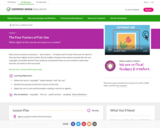
What rights to fair use do you have as a creator? Kids can be voracious consumers -- and creators -- of media, and it's easier than ever for them to find and share digital content online. But do middle schoolers know about concepts like fair use, copyright, and public domain? Give students a framework they can use to better understand how fair use works in the real world. Approximately 50 mins.
LESSON OBJECTIVES: Define the terms "copyright," "public domain," and "fair use." Identify the purpose of the Four Factors of Fair Use. Apply fair use to real-world examples, making a case for or against.
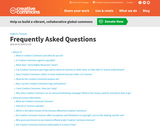
This list was developed by the Creative Commons site and addresses many common questions about types of Creative Commons Lisc. and how they relate to copyright.
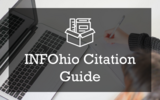
The INFOhio Citation Guide includes a variety of websites, tutorials, documents, and videos for grades 6-12 to support students as they cite sources and provide attribution for resources and images used during the research process.
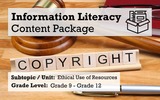
As high school students transition from consumers of information to creators of multimedia projects, understanding copyright, fair use, and citation issues is critical for educators and students. Students must be aware of the complexities of using online information, including text, images, audio, and video. Teachers require high-quality materials to support the teaching of information literacy, especially using resources ethically and responsibly. This content package is intended for educators to easily find lessons, eBooks, videos, articles, and other resources to support the teaching of using various content ethically and to help students understand their responsibility as creators to cite others' work.

A screencast lesson discussing different types of plagiarism and examining the issue including consequences and solutions. [3:20]

Fighting plagiarism is serious business. From brainchild-snatching to wholly quotables, plagiarists have plenty of wily ways to pass others' work off as their own- and all of them are threats to original thinking. Melissa Huseman D'Annunzio imagines what would happen if a Department of Plagiarism Investigation were on the case. [3:48]

This interdisciplinary project on birthstones, provided by the International Society for Technology in Education (ISTE), focuses on research skills, writing skills, and the ability to put together an electronic presentation.

This video discusses the issue of Intellectual Copyright and the laws that relate to it in both Canada and the U.S. [5:20]